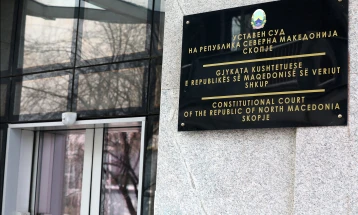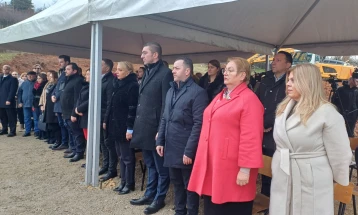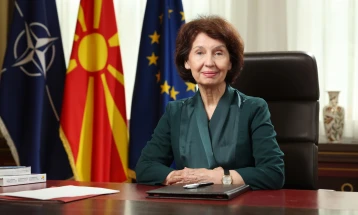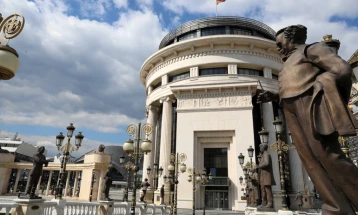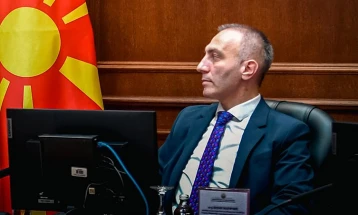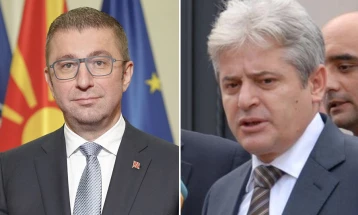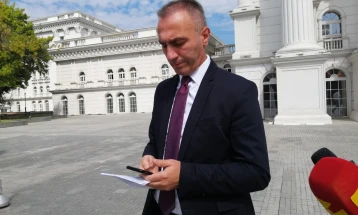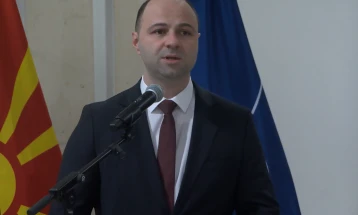MEP Waitz: Bulgaria under huge political pressure; it’s been isolated from some EU projects

Brussels, 27 October 2021 (MIA) - Thomas Waitz, a member of European Parliament (MEP) from Austria's Green Party and member of several parliamentary delegations with Western Balkan countries, said in an interview with MIA that Bulgaria is facing severe political pressure to lift its veto against North Macedonia, and that he’s convinced that the issue will be resolved as soon as Sofia forms a new government.
We’re two months away from the next European Council, and Bulgaria is holding elections in November, so the issue is unlikely to be resolved by December. This would mean a renewed veto for North Macedonia. Do you expect any shifts in December?
I just came back from Bulgaria a week ago. I spoke with various political factors, including the parties running in the elections. I saw a general change in the narrative. The main supporters of this veto were either not re-elected in Parliament, or their poll results are bad, even GERB, which played the anti-Macedonian card in order to remove the focus from internal political issues. Unfortunately, this led to an EU-level blockade. What I can tell you is that Bulgaria is under tremendous political pressure. It’s being kept away from multiple projects, which is affecting so its everyday diplomatic activities. I spoke to a Bulgarian representative in the Council of Europe, who is politically engaged, and he reiterated some of the issues they have and that both nations need to resolve amongst themselves. This is completely normal, for instance, Austria and Slovenia still had bones to pick after WWII.
The Bulgarians say they can’t take the pressure anymore, they’ve been completely isolated from the diplomatic scene, and it’s just not worth it for Bulgaria to take this risk because there’s no big underlying economic issue, it’s just building nationalist rhetoric. Sadly, Bulgaria will have third elections. I expected negotiations for government formation after the second elections, but that didn’t happen. What I see behind the scenes now is that none of the parties want to touch this topic before a new government is formed. The Macedonian side understands this, which is why the debates have calmed down. We don’t want right-wing parties to get a head start, which is why we’re not starting the debate back up. It’s an emotional issue, as well. Diplomats have confirmed to me that Bulgaria was the first country to recognize Macedonia’s independence, so there’s a history of good-neighborly relations serving as a foundation to build on. Bulgaria led the process of recognizing Macedonia’s independence. Unfortunately, until the elections in November and until a new government is formed, I don’t expect attitudes to change, but we keep on putting pressure and hoping. It depends on how quickly they form a government, but I feel that they’ll be in the process of putting it together, so they won’t be in a position to bring any far-reaching decisions. It’s the only thing we can expect for the time being, sadly. I can see they’re ready to make concessions, but the Macedonian side will have to do some sort of symbolic move, too.
Symbolic as in making concessions on something?
Some of these debates are ridiculous. Which songs belong to which country, why is this book titled “Macedonian Folk Songs” instead of Bulgarian and vice versa. As an Austrian, I find it incomprehensible. I have land on the border with my Slovenian neighbors and we just stand together singing the same songs in our respective languages. It’s a joint European heritage, we all have our heritage and identities connected. I mean a symbolic move such as renaming a folk song book to “Macedonian and Bulgarian songs”. We’re just trying to find a solution.
A huge majority of the European Parliament shares the same sentiment: we made a promise to North Macedonia, we’ve asked the country to fulfill some criteria and we’ve promised to start negotiations. We owe it to the country to make good on this promise if we want to be a trusted partner. We’re doing all we can to clear the path, increasing the pressure in various ways: through diplomacy, the government, the Council. Look at the European Parliament. We have a few crazy Bulgarian members of the European Parliament without a party, inciting hate, and on the other hand, there is over 700 members of the European Parliament from every other political party saying “this is ridiculous, let’s get past this veto”. Bulgaria truly is facing tremendous pressure.
You said that one facet of this pressure is the fact that Bulgaria is kept away from some projects. You mentioned the Council of Europe, but is this the case in the EU too?
Yes. I won’t get into details because it would go against the strategy. Here’s a concrete example, though: it’s not just keeping them away from certain initiatives, their demands aren’t being pushed, either. Bulgaria has its demands for the EU, it needs additional support such as cohesive funds, recovery funds, just transition. Bulgaria needs a lot of support to move past using coal, for example. The understanding that the other EU governments have towards Bulgaria is very limited at the moment. It is what it is.
You mentioned that the Bulgarian citizens don’t care about the Macedonian issue in the elections, if the results of the first elections this summer say anything, but it still didn’t stop the Bulgarian politicians from spreading nationalist rhetoric, including the president, even though it doesn’t bring them any votes.
Like I said, it’s become an emotional issue. Part of the population is focusing on an insignificant problem. Moderate parties are also abstaining from opening this issue back up because they don’t want right-wing and extreme right-wing parties to capitalize on this emotion. They’re trying to be careful to avoid a nationalist majority that will abuse this. The people of Bulgaria are tired of dysfunctional institutions, high corruption, the fact that gangsters rule in their country. There is also a huge focus on the internal process, how to overcome old structures, and how to turn Bulgaria into a modern Western country after so many years.
North Macedonia’s accession is not a pressing issue at the moment. Progressive parties also want to talk about living standards, institutions that serve the citizens, a functional legal system, and that’s where they’re keeping the focus in order to form a majority. I’m optimistic that this issue can be resolved, we just need to wait for the elections to end and for a government to form.
So, you don’t have any hopes for December?
We’re still trying to make it happen, so I wouldn’t completely take it off the table. What I’m trying to say is that, even if it doesn’t happen in December, it’ll still happen soon, very soon after Bulgaria forms a government. This will be one of the first topics on their agenda. Bulgaria can take the veto back any day, it doesn’t need the European Council to do this. They could decide to lift the veto on Monday morning, send the message to the other member states, and get the first Inter-governmental Conference started.
Meanwhile, trust in the EU is rapidly declining in North Macedonia. Numbers show that the people don’t believe the things the EU is saying, its credibility has been affected greatly. How will you restore it?
First of all, you may not have noticed this, but we’re trying not to decouple North Macedonia and Albania. There’s an approach that says we shouldn’t punish Albania for a situation it can’t control. They’re complaining to us and asking for negotiations to start, but we’re holding onto this principle because it helps us maintain pressure. That’s one of the commitments. Another commitment is EU’s regional investments. I know it can’t replace the progress towards EU membership, but it’s significant. We’re investing a lot in the region, in its infrastructure, building institutions... We’re showing lots of support.
We’re trying, but I’d like to suggest a different perspective. As much as I hate this veto, it shows that being a EU member means you don’t give up on your national autonomy. We accept and deal with the decisions even small or medium-sized countries make. We don’t ignore them, we negotiate, put pressure, we want them to be reasonable, but it means that small and medium-sized countries can defend their EU interests, which can be seen as a positive by a potential future EU member, such as North Macedonia, which would be a small member state. Your rights to express your will and affect big decisions would be respected. It’s the EU, a union of compromise and negotiations, which makes processes longer sometimes, but that’s how we solve issues.
We saw in the first round [of the October local elections] that the ruling party SDSM is losing its influence. As a member of the European Parliament, what do you think of this? Is it connected to the failures towards the EU?
I see that they’re losing influence on a local level, but nationally, the citizens still support the ruling party. These are two different levels. Zaev’s party is losing locally because it didn’t fulfill the citizens’ hopes of good local governance. I don’t want to point fingers. It’s a process and it takes time, a country doesn’t change overnight, but the citizens expect more, they expect transparency, distance from clientelism, less partisanship in the institutions. I think it’s clear that the citizens expected more, which is why, I believe, they’re losing locally and the loss is felt the most at a local level. SDSM should learn from this, but so should every other party.
Tanja Milevska
Translated by Dragana Knezhevikj
